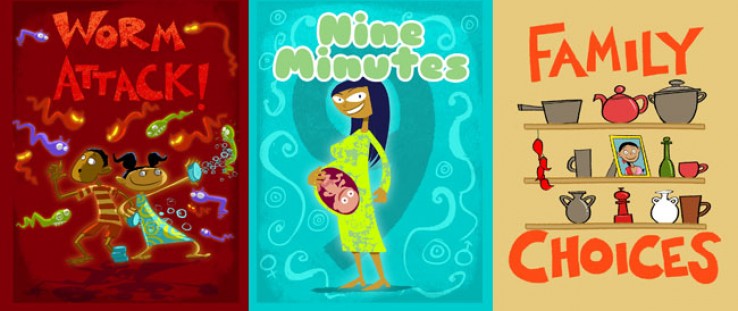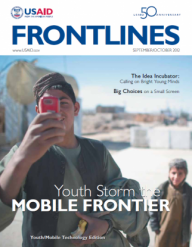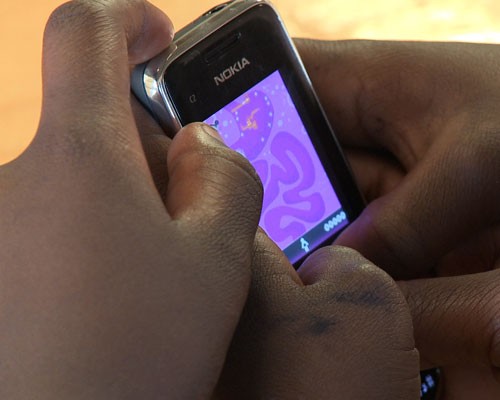 Worm Attack!, 9-Minutes, Family Choices mobile games
Games for Change/Mudlark
Worm Attack!, 9-Minutes, Family Choices mobile games
Games for Change/Mudlark
 Worm Attack!, 9-Minutes, Family Choices mobile games
Games for Change/Mudlark
Worm Attack!, 9-Minutes, Family Choices mobile games
Games for Change/Mudlark
Meet Anu, a 13-year-old girl who lives with her mother, father and brother, Binod, in rural India. Like many teenagers, Anu will be barraged with a series of choices such as whether to stay in school or to leave in order to help her family; whether to marry before completing her education; whether she and her husband should use family planning; and when they should start their family. All of the decisions will impact Anu and her family’s future.
The only difference between Anu and millions of other teenagers in the developing world is that she is made of bits and bytes instead of flesh and blood. She represents a new push by USAID and the international development community to parlay the rapid expansion of mobile devices—and the mobile games that keep their users engaged—into a resource for development.
“Family Choices”—Anu’s milieu—was developed as part of the USAID-supported Half the Sky Movement, a multi-donor, multimedia platform developed by film and game producers Show of Force and Games for Change, in collaboration with Nicholas Kristof and Sheryl WuDunn, the Pulitzer Prize-winning authors of Half the Sky: Turning Oppression into Opportunity for Women Worldwide.
USAID supports the initiative through the C-Change project with a $1.4 million investment that has produced 18 short education and advocacy videos for use in India, Liberia, Somaliland and East Africa, and three hand-held mobile games developed for India and East Africa on topics as diverse as family planning and reproductive health, maternal and child health, girls’ education, domestic violence and other gender-related themes.
In Family Choices, a three-episode game, players watch as Anu grows up and makes decisions related to staying in school, gender issues, distribution of household responsibilities and challenges related to poverty. A positive decision leads to a golden leaf and another step toward independence and empowerment, and allows the player to progress to the next episode. Negative choices put unadorned leaves in the player’s family tree, and lead to an invitation to repeat the episode to explore multiple pathways and their respective endings. As the game progresses, as in real life, the choices get harder. Episodes two and three also address early marriage, pregnancy, family planning and pursuit of higher education.
Says Asi Burak, co-president of Games for Change, “Social games offer a unique way to reach your audience in a way that is not didactic or preachy. By playing a role and making choices, players are participating in a rehearsal for life. They experiment with scenarios and consequences that may be part of their future, and at the very least, this experience triggers reflection, debate, and a new perspective on their present situation.”
The overall aim of Family Choices is to enhance the perception of girls’ place in and value to families, with an emphasis on keeping girls in school. This game and others created under this initiative build upon principles consistent with social learning theory, which asserts that people learn through observing others’ behaviors and attitudes.
Mobile Explosion
There are 6 billion mobile phone subscriptions worldwide and three-quarters of them are in developing countries. It is that near-ubiquity of the technology that the coalition is trying to harness with Family Choices and two other games that use social learning theory to engage players around the topics of pregnancy health, child health, girls’ education and empowerment.
“9-Minutes” simulates the experience of nine months of pregnancy in nine minutes. The game presents players with a series of physical, medical and social choices in a race against the clock. Players race to collect icons that represent pregnancy “do’s” for a particular month of pregnancy and to avoid icons representing the pregnancy “don’ts.” The player’s choices on topics such as having a birth plan, gaining family support, nutrition, getting antenatal care, and going to a health facility for delivery, determine the health and well-being of both the mother and her baby.
Maternal and child health are essential issues in both India and East Africa where the games will be distributed. In 2005 to 2006, the infant mortality rate in India was 57 for every 1,000 live births, and only 38 percent of live births occurred in health facilities. In Kenya and Tanzania, the lifetime risk of maternal death is 1 in 55 and 1 in 38, respectively. Infant mortality rates in both countries are also high.
“I would share the game with all pregnant women I know because it has a lot of information and it was fun to play,” said a 29-year-old Indian woman*, nine months pregnant, on her experience playing 9-Minutes.
In “Worm Attack!” young players, their teachers and their families work to rid themselves and their communities from infestation of intestinal worms, a problem that leads to diarrhea, anemia, internal bleeding, malnutrition and other symptoms. Worms affect 600 million school-age children worldwide, and studies show that those who are regularly dewormed are more likely to stay in school, have higher rates of literacy, and have greater earning potential.
Adventure and Simulation
All three games use two common models to achieve social impact—adventure and simulation. Players are exposed to characters that can serve as role models, and will be rewarded for positive actions, such as killing the worms inside their stomachs or seeking antenatal care. Players also face choices, such as making decisions that lead to a delay in marriage and betterment of the family.
The three games, produced with game studio Mudlark and publisher E-line media, will be launched in September for use on feature phones in India, Kenya and Tanzania, and will be produced in English, Hindi and Kiswahili. Their roll out will be accompanied by short educational videos for use in local community health and gender programs. The games will also be available through in-country mobile phone app stores for free. The Half the Sky Movement estimates that, with continued funding, 1 million users will be reached with these products.
Phones that support basic Java are most commonly used in the target countries, increasing access to the game through mass distribution channels. But there are still accessibility issues based on cost to download, Internet access, and the sharing of a single phone by multiple users. To help address accessibility barriers and to increase the impact of the games, they are being packaged with related videos and a facilitator’s manual. It is generally recognized that games will have a greater impact when used as part of a larger health, gender or education strategy.
Preliminary testing of Family Choices in Kenya found the games were positively received. One woman* who played the game said her favorite part was when “Mercy [Kenya’s version of Anu] stood her ground and she didn’t let anyone interfere with her dreams.”
Kara E. Tureski is with FHI 360’s C-Change Project.
*Name withheld for privacy reasons.










Comment
Make a general inquiry or suggest an improvement.